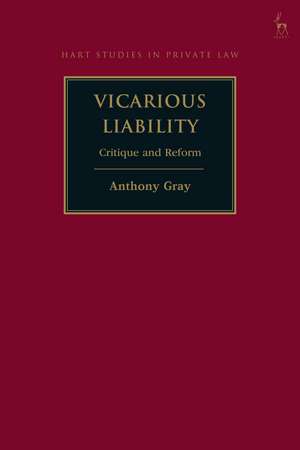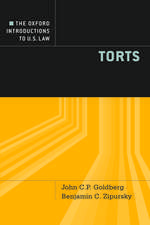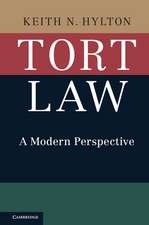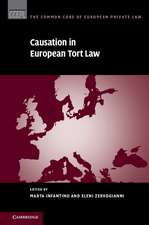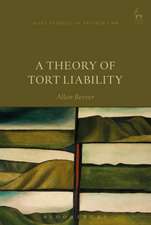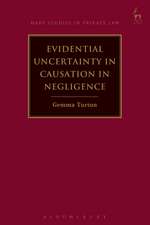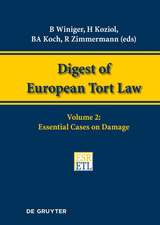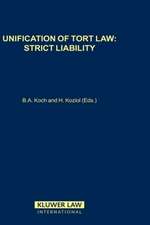Vicarious Liability: Critique and Reform: Hart Studies in Private Law
Autor Professor Anthony Grayen Limba Engleză Paperback – 24 mar 2021
| Toate formatele și edițiile | Preț | Express |
|---|---|---|
| Paperback (1) | 265.18 lei 43-57 zile | |
| Bloomsbury Publishing – 24 mar 2021 | 265.18 lei 43-57 zile | |
| Hardback (1) | 541.38 lei 43-57 zile | |
| Bloomsbury Publishing – 19 sep 2018 | 541.38 lei 43-57 zile |
Din seria Hart Studies in Private Law
- 30%
 Preț: 509.60 lei
Preț: 509.60 lei - 22%
 Preț: 237.66 lei
Preț: 237.66 lei -
 Preț: 217.53 lei
Preț: 217.53 lei - 28%
 Preț: 498.73 lei
Preț: 498.73 lei - 28%
 Preț: 437.06 lei
Preț: 437.06 lei - 22%
 Preț: 238.22 lei
Preț: 238.22 lei - 19%
 Preț: 296.53 lei
Preț: 296.53 lei - 30%
 Preț: 1129.41 lei
Preț: 1129.41 lei - 28%
 Preț: 374.46 lei
Preț: 374.46 lei - 30%
 Preț: 601.04 lei
Preț: 601.04 lei - 28%
 Preț: 436.15 lei
Preț: 436.15 lei - 18%
 Preț: 302.52 lei
Preț: 302.52 lei - 30%
 Preț: 602.11 lei
Preț: 602.11 lei - 22%
 Preț: 225.06 lei
Preț: 225.06 lei - 22%
 Preț: 258.42 lei
Preț: 258.42 lei - 30%
 Preț: 569.60 lei
Preț: 569.60 lei - 30%
 Preț: 600.06 lei
Preț: 600.06 lei - 30%
 Preț: 598.45 lei
Preț: 598.45 lei - 18%
 Preț: 322.23 lei
Preț: 322.23 lei - 28%
 Preț: 498.16 lei
Preț: 498.16 lei - 18%
 Preț: 320.53 lei
Preț: 320.53 lei - 30%
 Preț: 601.29 lei
Preț: 601.29 lei - 30%
 Preț: 541.54 lei
Preț: 541.54 lei - 22%
 Preț: 261.64 lei
Preț: 261.64 lei - 30%
 Preț: 570.99 lei
Preț: 570.99 lei - 30%
 Preț: 541.38 lei
Preț: 541.38 lei - 18%
 Preț: 357.83 lei
Preț: 357.83 lei - 22%
 Preț: 232.54 lei
Preț: 232.54 lei - 30%
 Preț: 774.86 lei
Preț: 774.86 lei - 22%
 Preț: 269.76 lei
Preț: 269.76 lei - 30%
 Preț: 719.33 lei
Preț: 719.33 lei - 30%
 Preț: 774.28 lei
Preț: 774.28 lei - 18%
 Preț: 322.05 lei
Preț: 322.05 lei - 22%
 Preț: 776.24 lei
Preț: 776.24 lei - 30%
 Preț: 540.38 lei
Preț: 540.38 lei - 30%
 Preț: 838.22 lei
Preț: 838.22 lei - 27%
 Preț: 409.73 lei
Preț: 409.73 lei - 30%
 Preț: 569.37 lei
Preț: 569.37 lei - 30%
 Preț: 514.01 lei
Preț: 514.01 lei - 30%
 Preț: 544.05 lei
Preț: 544.05 lei
Preț: 265.18 lei
Preț vechi: 340.23 lei
-22% Nou
Puncte Express: 398
Preț estimativ în valută:
50.76€ • 55.15$ • 42.66£
50.76€ • 55.15$ • 42.66£
Carte tipărită la comandă
Livrare economică 21 aprilie-05 mai
Preluare comenzi: 021 569.72.76
Specificații
ISBN-13: 9781509943876
ISBN-10: 1509943870
Pagini: 296
Dimensiuni: 156 x 234 x 19 mm
Greutate: 0.42 kg
Editura: Bloomsbury Publishing
Colecția Hart Publishing
Seria Hart Studies in Private Law
Locul publicării:London, United Kingdom
ISBN-10: 1509943870
Pagini: 296
Dimensiuni: 156 x 234 x 19 mm
Greutate: 0.42 kg
Editura: Bloomsbury Publishing
Colecția Hart Publishing
Seria Hart Studies in Private Law
Locul publicării:London, United Kingdom
Caracteristici
The author provides a strong critique of the 'enterprise risk' theory and an argument for reform of the current law that places agency at the centre of the doctrine
Notă biografică
Anthony Gray is Professor of Law at the University of Southern Queensland, Australia.
Cuprins
PART I: OUTLINE OF DEVELOPMENT OF VICARIOUS LIABILITY IN CHOSEN JURISDICTIONSIntroduction to Part I 1. Developments in English Legal History Historical Development of Vicarious Liability Until the Early Twentieth Century Vicarious Liability in the Context of Other Developments in Tort Law Summary and Reflections on Historical Development of Vicarious Liability 2. Developments in United Kingdom Vicarious Liability Law: Twentieth and Twenty-First Centuries Development Most Recent Developments Some Critique and Reflection on United Kingdom Case Law 3. Developments in Australian Case Law Historical Development Most Recent Developments Some Critique and Reflection on Australian Case Law 4. Developments in North American Case Law Canadian Development United States Developments Conclusion to Part I PART II: THEORIES OF VICARIOUS LIABILITYIntroduction to Part II 5. Enterprise Risk Theory Scholarly Support for Enterprise Risk Theory 6. Criticisms of Enterprise Risk Theory Summary of Weaknesses in Relation to Enterprise Risk as a Species of Strict Liability to Justify the Imposition of Vicarious Liability Historical Weaknesses The Theory Does Not Explain the Existing Contours of Vicarious Liability The Theory Seems Applicable as a General Principle by which an Organisation is Liable to Others for Harms Caused, but is Not So Applied It Makes 'Brave' Assumptions about Loss Spreading and Insurance It Does Not Describe How Judges Actually Decide Tort Cases, and Does Not Describe How Judges Should Decide Tort Cases It Relies on Inherently Ambiguous Concepts Deterrence 7. Other Theories Evidentiary Considerations Deep Pockets Fair, Just and Reasonable Conclusion 8. Agency Theory Introduction to Agency Theory of Vicarious Liability Pragmatism and Principle (a) Argument that the Act of the Agent (Employee) is in Effect the Act of the Principal (Employer) (b) Argument that the Law of Vicarious Liability Imposes Liability on the Principal (Employer) for the Acts of the Agent (Employee), but Does Not Consider them the Employer's Acts The Law of Agency Conclusion to Part II PART III: MISCELLANEOUS ISSUESIntroduction to Part III 9. The Relationships to Which Vicarious Liability Might Attach Establishing that an Employment Relationship Exists The Exceptionality of Making One Person Liable for the Actions of Another Why Has the Law Fixated on 'Control' in Relation to Liability for What Another Did? Borrowed Employees and the Possibility of Dual Vicarious Liability Conclusion 10. Non-Delegable Duties Relationship with Vicarious Liability Development of the Non-Delegable Duty Concept in the United Kingdom Australian Developments Criticisms of the Concept of a Non-Delegable Duty Conclusion 11. Punitive Damages Punitive or Exemplary DamagesNature of Punitive Damages Reflections on Punitive Damages in the Vicarious Liability Context Conclusion Conclusion to Part III Conclusions
Recenzii
Gray is to be praised for this brave attempt to rationalise the law relating to vicarious liability and in presenting, in particular, the arguments for and against enterprise liability in such a clear and accessible manner.
As the ongoing debate on vicarious liability rages on - more or less, incessantly - this carefully researched treatise provides a much-needed alternative perspective - a critical eye indeed - on this contentious subject. Corporate lawyers, particularly of the comparative variety, will find this book a rather fascinating read.
As the ongoing debate on vicarious liability rages on - more or less, incessantly - this carefully researched treatise provides a much-needed alternative perspective - a critical eye indeed - on this contentious subject. Corporate lawyers, particularly of the comparative variety, will find this book a rather fascinating read.
